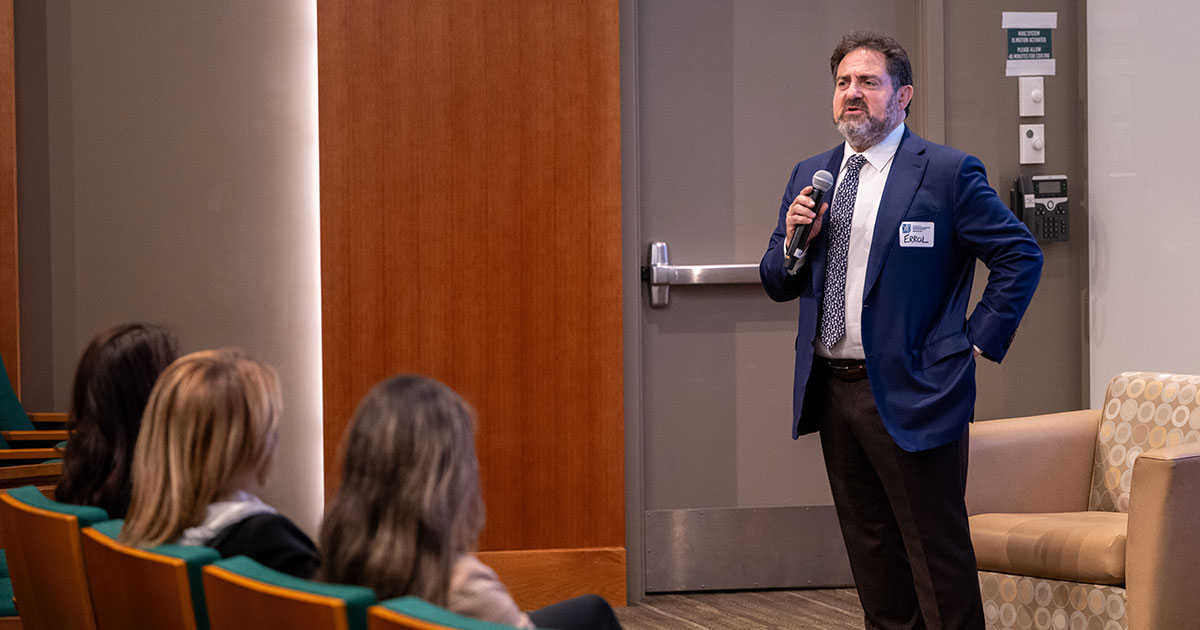GEM Report: U.S. Entrepreneurial Activity Returns to Historic High

According to the latest Global Entrepreneurship Monitor (GEM) 2024–2025 United States Report, Total Entrepreneurial Activity (TEA) returned to the historic high of 19% reached two years earlier. This signals significant entrepreneurial dynamism across the United States. TEA measures the percentage of adults actively engaged in starting or running a new business.
“This is a powerful indicator of the creativity and ambition of American entrepreneurs,” said Babson College Professor of Entrepreneurship Donna Kelley P’24, who has been leading the annual GEM U.S. study since 2011. “This year’s report reveals a broad cross-section of Americans starting businesses, including veterans and active-duty military, immigrants and Americans born abroad, and also demonstrating gender and racial/ethnic diversity. Collectively, these entrepreneurs contribute to job creation, innovation and global competitiveness for the United States.”
READ MORE: Read the complete GEM U.S. 2024-2025 report.
While the new GEM report shows a high level of entrepreneurial activity, many people are starting businesses out of necessity and fewer are running mature businesses. Over two-thirds of entrepreneurs cite job scarcity as a motive for starting a business, continuing an upward trend since 2022. Additionally, only 6.6% of Americans run mature businesses—below the average of 32 high-income economies—with closures rising due to unprofitability and financing issues.
The Global Entrepreneurship Monitor was founded in 1999 as a joint venture of Babson College and the London Business School. The annual U.S. report tracks entrepreneurship rates and characteristics, as well as attitudes and self-perceptions about starting businesses, across all genders, race/ethnicities, and age groups.
“By providing more timely insights, we can better inform strategies that support business creation, innovation, and economic growth, maximizing the report’s impact in shaping the future of entrepreneurship in the United States.”
Jeffrey P. Shay ’87, MBA’91, Babson professor of entrepreneurship
The GEM U.S. report this year was released six months earlier than in previous years, making the data more relevant and actionable with its timeliness.
“By providing more timely insights, we can better inform strategies that support business creation, innovation, and economic growth, maximizing the report’s impact in shaping the future of entrepreneurship in the United States,” said Jeffrey P. Shay ’87, MBA’91, professor of entrepreneurship at Babson College.
New insights from the U.S. report include important takeaways on global digital technology and artificial intelligence (AI), U.S. military status, and regional trends. Explore some of the key findings below and what they mean, to understand how these trends are shaping the entrepreneurial landscape in the United States.
Women Entrepreneurs
- Women reported higher capability perceptions in 2024, compared to the prior year, although it was nearly one-quarter lower than for men (48% vs. 63%).
- Women entrepreneurs also showed a nearly one-quarter increase over the prior year in the percentage with international market scope in 2024, equal to the level reported by men (27%).
Why It Matters: Women entrepreneurs show remarkable resilience and adaptability, yet persistent gender gaps in self-perceptions may deter their startup ambitions, the report says. Ensuring that the entrepreneurship ecosystem can support their unique needs will be critical in ensuring that women entrepreneurs continue to thrive and benefit U.S. society.
Digital Technologies and AI
- Entrepreneurs (68%) and business owners (47%) report that over a quarter of their sales come through digital technologies, with the majority expecting this to grow in the next six months.
- While 63% of entrepreneurs and 49% of business owners already use AI, even more anticipate its critical role in shaping their strategies within three years.
- Data analytics (81%) and social media (91%) are widely adopted by entrepreneurs, underscoring the importance of digital tools and platforms in modern business.
Why It Matters: Digital transformation is redefining the entrepreneurial landscape, with 68% of entrepreneurs already conducting significant business online. The GEM report indicates that by reducing barriers to technology adoption and addressing AI-related concerns like data privacy, companies and policymakers can empower small businesses to thrive in the digital age, enhancing resilience and competitiveness.
Optimism, Opportunity, and Impact
- Black (90%) and Hispanic (87%) populations are more likely than White individuals (80%) to view entrepreneurship as a good career choice.
- Black individuals show more optimism about starting a business, with 65% believing it is easy (vs. 59% of Hispanic people, 55% of White people), higher opportunity perceptions (78% vs. 61% for Hispanic people and 56% for White people), and lower fear of failure (37% vs. 46% for both Hispanic and White people).
- Black and Hispanic entrepreneurs prioritize making a difference (71% for both) and building wealth (79% and 82%) more than their White counterparts (63% and 68%), showcasing entrepreneurship as a pathway to empowerment.
Why It Matters: Black and Hispanic people exhibit higher entrepreneurial intentions and entrepreneurship rates, underscoring their critical role in shaping the U.S. business landscape. Targeted support for underrepresented communities can bridge opportunity gaps, amplifying their contributions to economic growth and social equity.
Sustainability on the Rise
- In 2024, 60% of entrepreneurs and 47% of established business owners prioritized social and environmental impact above profitability, reversing a prior year’s decline.
- A record 62% of entrepreneurs and 59% of business owners took steps to minimize environmental impact, while 59% and 50%, respectively, focused on maximizing social impact.
- Entrepreneurs and business owners aged 18–34 are leading the charge, more likely to prioritize sustainability and take impactful actions than their older counterparts.
Why It Matters: A growing number of entrepreneurs prioritize social and environmental sustainability, reflecting a shift toward values-driven business practices. Entrepreneurs rely on a variety of stakeholders to support their businesses: investors, customers, suppliers, employees and advisors, to name a few. By reinforcing sustainable entrepreneurship these partners can play a major role in helping to foster ventures that address global challenges while generating economic prosperity.
Military Veterans
- Active-duty military and veterans outpaced non-military/non-veterans in established business ownership, reporting a 16% and 11% rate compared with 6.1% for those without military service.
- Nearly half of those serving part time or full time in the military were in the process of starting or running a new business, but among veterans, there was an equal likelihood of being an entrepreneur as those without military or veteran status (19%).
Why It Matters: Veterans and active-duty military personnel bring exceptional leadership and resilience to entrepreneurship, with nearly half of service members in the process of launching or running businesses. Their higher rates of established business ownership highlight their ability to build sustainable enterprises. The report also suggests that being one’s own boss may represent an attractive opportunity for those who have spent years in the armed forces and, perhaps, for those needing flexibility—such as those serving part-time or on-call for activation or deployment, or those with disabilities that could pose challenges for traditional employment.
Posted in Insights



